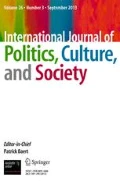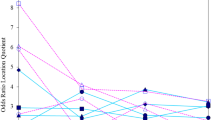Abstract
For the last 20 years, many mobilizations related to the contract work system that is subsidized by the general unemployment insurance system have occurred in various French artistic fields, mainly in the performing arts. They are characterized by an intense politicization which can be explained by the role of the state in these fields. On the one hand, state intervention suspends the rules of the market economy. On the other hand, the state is one of the main users of the unemployment insurance system which externalizes labor costs. Politicization is also based on the limited resources of the mobilized groups. Thus, these groups promote permanent media coverage of their fights in order to force the political leaders to speak out in their support. Politicization has also led these groups to try to destroy the political capital of some Ministers of Culture. In conclusion, the present work emphasizes that the artists’ demand for the state, which relies on the will to increase aesthetic autonomy, may eventually lead to the opposite situation, the artists becoming dependent on political constraints they do not master.
Similar content being viewed by others
Notes
The CGT is the most left wing union. It was under the influence of the French communist party for many decades while the CFDT is a reformist union.
We can refer to the theories concerning the end of the Fordist condition of employees and to the development of cognitive capitalism whose “slave driver” trend is one of the main carriers. See “l’intermittence dans tous ses états”, Multitudes, no. 17, summer 2004.
"Could we not, for example, now do for the theatre what exists for the other arts: competition and prizes? A commission which would share out funds to the directors whose projects appeared to it the most interesting” L. Jouvet, quoted in Gontard (1973, p. 133).
To give an idea of the magnitude, the deficit of the system (800 million euros in 2004) was that year, according to the minister himself, the equivalent of the management budget of theater, music, dance, and shows (source: Jean-Jacques Aillagon, Intervention devant la mission parlementaire d’information sur les métiers artistiques, 21 January 2004).
Roussille (B.), Sciortino (J.), Rapport sur le système de protection sociale des ouvriers, techniciens et artistes intermittents du spectacle vivant et enregistré, IGAS, Paris, 1985.
This control varies among different categories of artists. It is one of the conditions for occupying the highest positions which ensure a successful career as a director (managing a national theatre), but access to these positions of the artistic elite is only possible if these artists combine control of state categories and assert their irreducible singularity, but not to the extent of risking exclusion (on the artistic elite, see Heinich 2005).
A “coordination” is an informal local committees of mobilized art professionals who work in the same town. A coordination only last for a few months, few years for some of them.
From this point of view, we must distinguish between mobilizations around the contract work system and those which take place in the same fields, but mainly in large institutions, which concern the definition of collective agreements and which can occur in the more conventional framework of clashes between employers and employees.
The small group involved is acting in dangerous conditions: the roof is narrow (22 × 5 m), without a handrail (there is only a 22-m cable along the central ridge for the watchmen and the roofers). Conditions are makeshift (a bucket for the toilet). The occupation was to last 5 days.
“I chose to go on the stage in a closed place, not in the street. This evening, if I were a company leader, I would be present to play. Whatever the event which occurs in the life of an actor or in the street, he must play.” J. Vilar, quoted in Volponi (1988, p. 27).
Chéreau (P.), “Comment peut-on renoncer à jouer ?”, (“How can one relinquish acting?”) Nouvel Observateur, no. 2002, 6 August 2003.
The career of J.J. Aillagon, a former history teacher in a high school in Corrèze, follows in the wake of J. Chirac. He alternated positions at the head of cultural establishments and responsibilities in the cultural department of the city of Paris before being appointed Minister of Culture in 2002. On the contrary, Renaud Donnedieu de Vabres, the son of a maître des requêtes (member of the Conseil d’Etat), former student of the ENA, had the classic career of the French politico-administrative elite, combining responsibilities as a senior civil servant (préfecture) and at the head of partisan organizations (UDF then UMP) before occupying ministerial positions.
Dauphiné-Vaucluse, July 19, 2006.
References
Becker, H. S. (1963). Outsiders. New York: The Free Press of Glencoe (French translation).
Becker, H. S. (1985). Outsiders. Études de la sociologie de la deviance. Paris: Métailié.
Bourdieu, P. (1977). La production de la croyance. Contribution à une économie des biens symboliques. Actes Rech Sci Soc, 13, 3–43.
Champagne, P. (1990). Faire L’opinion. Le nouveau jeu politique. Paris: Minuit.
Castel, R. (1995). Les métamorphoses de la question sociale. Paris: Gallimard.
Charle, C. (1990). Naissance des “intellectuals” 1880–1990. Paris: Minuit.
Contamin, J. G. (2005). Le choix des armes: les dilemmes pratiques d’un mouvement de doctorants et le modèle des avantages comparatives. Genèses, 59, 4–24.
Coulangeon, P. (2004). Les musiciens interprètes en France. Portrait d’une profession. Paris: La Documentation Française.
Dobry, M. (1986). Sociologie des crises politiques. Paris: PFNSP.
Dubois, V. (1999). La politique culturelle. Genèse d’une catégorie d’intervention publique. Paris: Belin.
Goetschel, P. (2004). Renouveau et décentralisation du théâtre. 1945–1981. Paris: PUF.
Gontard, D. (1973). La décentralisation théâtrale. Paris: SEDES.
Heinich, N. (2005). L’élite artiste. Excellence et singularité en régime démocratique. Paris: Gallimard.
Lagneau, E. (2005). Comment étudier la médiatisation des conflits? In J. M. Denis (Ed.), Le conflit en grève ? Tendances et perspectives de la conflictualité contemporaine (pp. 59–95). Paris: La Dispute.
Lehmann, B. (2002). L’orchestre dans tous ses éclats. Ethnographie des formations symphoniques. Paris: La Découverte.
Looseley, D. (1995). The politics of fun. Oxford: Berg Publishers.
Madral, P. (1969). Le théâtre hors les murs. Paris: Le Seuil.
Martin, A., & Ross, G. (1999). The brave new world of European labor. New York: Berghahn Books.
Menger, P.-M. (1994). Etre artiste par intermittence. La flexibilité du travail et le risque professionnel dans les arts du spectacle. Travail et Emploi, 60, 4–22.
Menger, P. M. (1997). La profession de comédien, formations, activités et carrières dans la démultiplication de soi. Paris: Ministère de la Culture et de la Communication.
Menger, P.-M. (2005). Les intermittents du spectacle. Sociologie d’une exception. Paris: Editions de l’EHESS.
Neveu, E. (1996). Sociologie des mouvements sociaux. Paris: La Découverte.
Paradeise, C. (1998). Avec la collaboration de F. Vourc’h, J. Charby. Les comédiens, professions et marchés du travail. Paris: PUF.
Proust, S. (2006a). Le comédien désemparé. Autonomie artistique et interventions politiques dans le théâtre public. Paris: Economica–Anthropos.
Proust, S. (2006b). Les luttes autour du régime de l’intermittence et leur radicalisation en 2003. In J. Balasinski & L. Mathieu (Eds.), Art et contestation (pp. 103–120). Rennes: PUR.
Siméant, J. (2005). Pratiques protestataires. Genèses, 59, 2–3.
Tarrow, S. (1994). Power in movement. Social movements, collective action and politics. Cambridge: Cambridge University Press.
Tilly, C. (1986). La France conteste de 1600 à nos jours. Paris: Fayard.
Urfalino, P. (1996). L’invention de la politique culturelle. Paris: La Documentation Française et Comité d’Histoire du ministère de la Culture.
Volponi, E. (1988). Alors camarade Vilar (ou la chronique échevelée de l’été 68 avignonnais). Avignon: PSP.
Author information
Authors and Affiliations
Corresponding author
Additional information
Copyright note: This article was originally published in French as part of the book ‘Les Artistes et la Politique. Terrain franco-américain’ edited by Violaine Roussel © Presses Universitaires de Vincennes, May 2010, ISBN: 978-2-84292-257-3). All rights, except for the English language rights, are with Presses Universitaires de Vincennes. Springer thanks PUV for giving us their kind permission to reprint. For copyright and permission requests for languages other than English please write to PUV@univ-paris8.fr or call +33 (0) 1 49 40 67 50.
Translated by Suzan Béraud.
Rights and permissions
About this article
Cite this article
Proust, S. Mobilization of Artists and Understanding of the Political Field: Struggles Around the Contract Work System. Int J Polit Cult Soc 23, 113–126 (2010). https://doi.org/10.1007/s10767-010-9095-3
Published:
Issue Date:
DOI: https://doi.org/10.1007/s10767-010-9095-3




